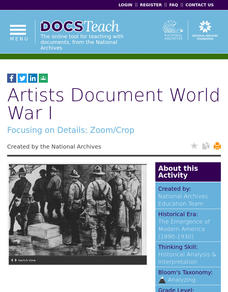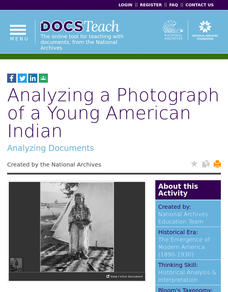DocsTeach
Comparing Urban and Rural Life in the Early 1900s
Experience a bit of what life was like at the turn of last century with images of rural and urban life. Learners consider pictures from each environment and then compare and contrast them. Activities include discussing the differences,...
DocsTeach
Chinese Exclusion Broadside Analysis
Racism against Asian American goes deep in American history. Using a broadside in favor of the Chinese Exclusion Act, class members examine clues—with key portions of the document blacked out—to better understand the roots of anti-Asian...
DocsTeach
Before and After Carlisle School
White reformers thought they were "killing the Indian" to "save the man." Native children were taken from their parents and placed at boarding schools, such as the Carlisle School. Using a comparative photo analysis of children before...
DocsTeach
Baseball on the World War I Homefront
Are sports essential to American life? Young historians ponder the question as they examine letters between the owner of the Boston Red Sox and Navy Secretary Franklin D. Roosevelt during World War I. The owner wanted two star players...
DocsTeach
Assimilation of American Indians
Imagine being forced to give up your culture and then being graded on how well you complied with orders to do so. Documents show young historians the price indigenous peoples paid as a result of the Dawes Act, which was essentially a...
DocsTeach
Artists Document World War I
Drawings may be worth even more than a thousand words. Curious scholars query an artist's rendering of troops leaving a ship after they have arrived in Europe to fight in World War I. By zooming in and looking at the entire piece, class...
DocsTeach
Analyzing Photographs of the Triangle Shirtwaist Factory Fire
While a catalyst for the labor movement, 146 people lost their lives in the Triangle Shirtwaist Factory Fire in 1913. A series of photographs of the aftermath of the tragedy help young historians consider the impact of the fire. The...
DocsTeach
Analyzing a Child Labor Photograph
Sometimes images tell shocking stories. Individuals examine a Lewis Hines picture of children packing beans and consider the impact working in a factory had on their young lives. A series of prompts emailed to the teacher helps them...
DocsTeach
Landing a Man on the Moon: President Nixon and the Apollo Program
Take the small step for man and giant leap for mankind with the Apollo astronauts using primary sources. Young historians explore the documents related to the American space program up through the lunar landing, including presidential...
DocsTeach
Analyzing Woodrow Wilson's Fourteen Points
The end of a war means the causes were resolved, right? Not for World War I. By examining Woodrow Wilson's Fourteen Points, budding historians consider imperialism, nationalism, militarism, and alliances, as well as Wilson's efforts to...
DocsTeach
Analyzing a Photograph of a Young American Indian
A true glimpse of the past, Angelic La Moose smiles back from more than 100 years ago. Young learners examine the picture of a young girl on a Montana Native American reservation from 1913 to comb it for historical details. A form, which...
DocsTeach
Nixon Visits China: The Week that Changed the World
Sometimes one trip shakes up the entire world. When President Richard Nixon traveled to China, he defied international and political boundaries. Nixon was the first American president to visit mainland China, which was a communist nation...
Angel Island Immigration Station Foundation
How Do Pictures Tell the Story of Angel Island?
Young historians learn more about the history of Angel Island Immigration Station through their analysis of primary source images. Guided by a list of inferential questions, scholars learn how to make and record observations on a...
Angel Island Immigration Station Foundation
The Chinese Exclusion Act
As part of a study of Angel Island Immigration Station, young historians examine the Chinese Exclusion Act of 1882, the first restriction on the United States immigration based on race and nationality. They complete a matrix identifying...
Angel Island Immigration Station Foundation
Where Is Angel Island? An Introductory Geography Lesson
Prepare young historians for a study of Angel Island Immigration Station with a lesson examining primary and secondary source materials, maps, and websites. Using what they have learned, individuals create a map of Angel Island, labeling...
National Woman's History Museum
Breaking Through Gender Roles: The Women of NASA
Whether recognized or not, extraordinary women were integral to breaking gender barriers and putting Americans into space. For Women's History Month, explore a series of video clips and biographical information that profile these...
National Woman's History Museum
Breaking Barriers: Women’s Basketball Documents
Is basketball ladylike? A pressing debate in the nineteenth century explored the issue in the sports world. Using images, news reports, and the rules of the game, young scholars decide whether the sport helped advance the cause of women...
C-SPAN
Choice Board - Conversations with Suffragists
Celebrate 100 years of women's suffrage by planning a re-enactment of famous women discussing their fight. After learners view a series of interviews with famous women played by actors, including Susan B. Anthony, Sojourner Truth, and...
Museum of the American Revolution
Through Their Eyes: Major Causes and Events of the American Revolution
Looking for an efficient way to explore the causes and results of the American Revolution? The American Revolution Museum offers a seven-lesson series to hit the highlights of this turning point, using primary sources and activities such...
National Woman's History Museum
Red Power Prevails : The Activism, Spirit, and Resistance of Native American Women
Native American women powered the American Indian Movement and other social changes, but they are often forgotten by history books. Examining a series of resources, including a documentary film, photographs, secondary sources, and social...
C-SPAN
Wonder Girls - Advocating for Global Issues
Move over Wonder Woman ... here come the Wonder Girls! Using video clips of photographer Paola Gianturco talking about her work, pupils consider the life experiences of girls around the world, including places such as Tonga and...
C-SPAN
Women's Contributions in the Civil War
Women's history is often hidden, but pupils discover the role women played in the Civil War using a series of video clips. After reviewing the interview with a scholar of women's history, class members fill out a chart and then research...
Roy Rosenzweig Center for History and New Media
The Revolutionary Times as Seen Through the Eyes of Women
The role of women before and during the American Revolution changed dramatically. To gain an understanding of these changes, middle schoolers analyze primary source documents, including letters from women that supported the patriot cause...
DocsTeach
The Impact of Westward Expansion on Native American Communities
Although Westward Expansion is often romanticized, its impact was devastating on Native American communities. Primary source documents, including pictures of United States troops invading indigenous lands and Native American tribes, tell...























